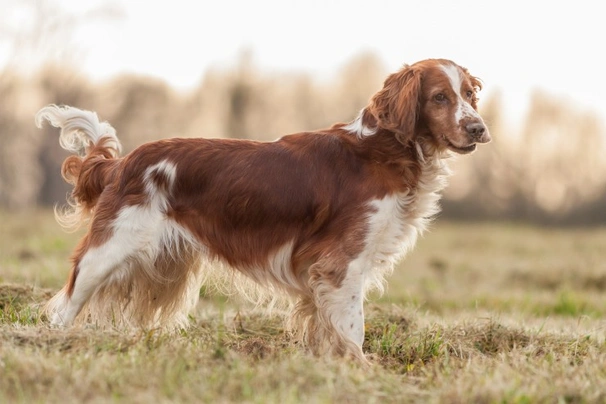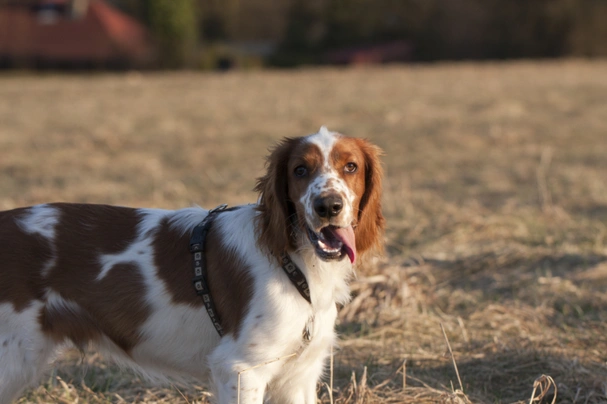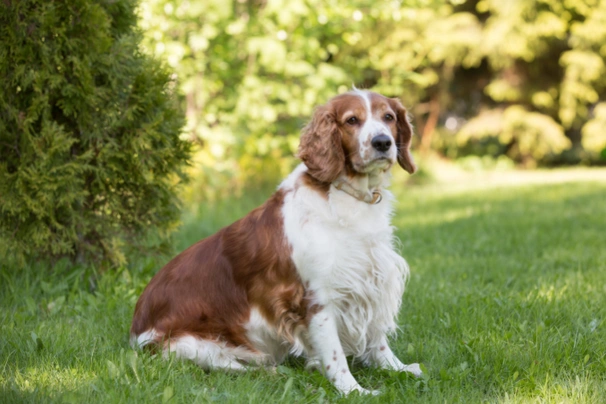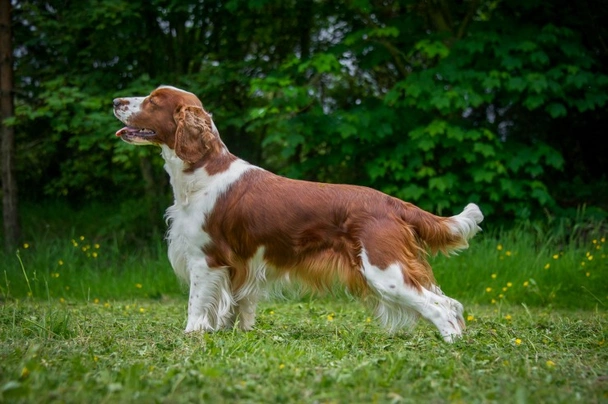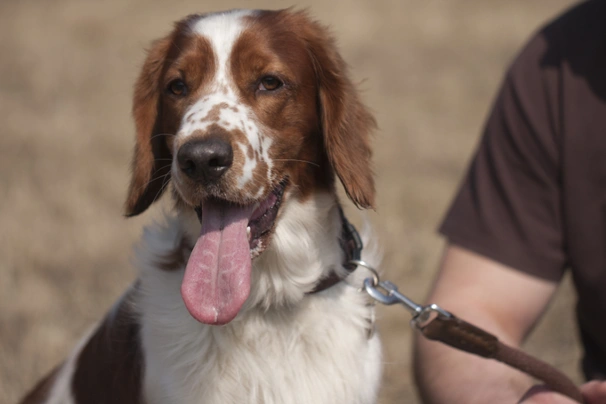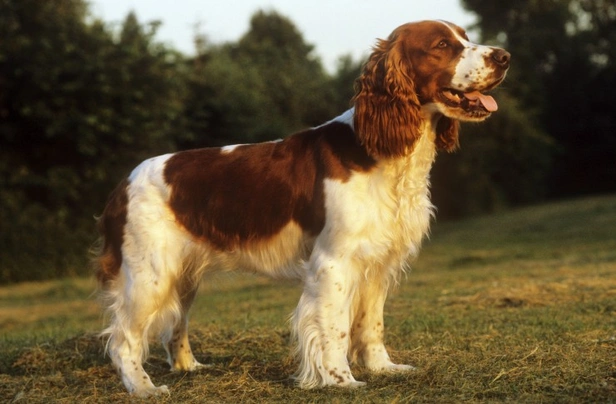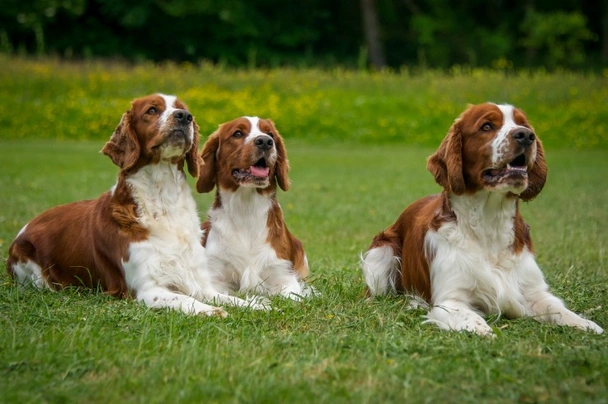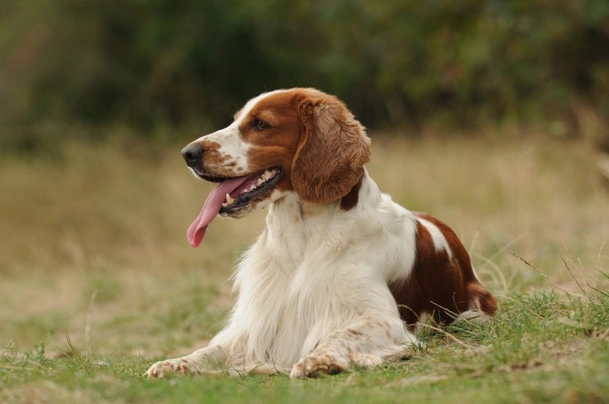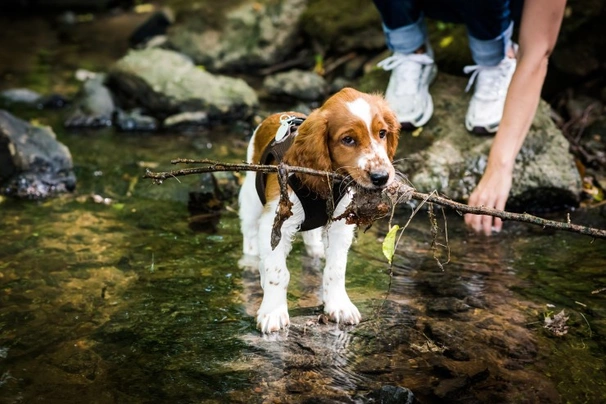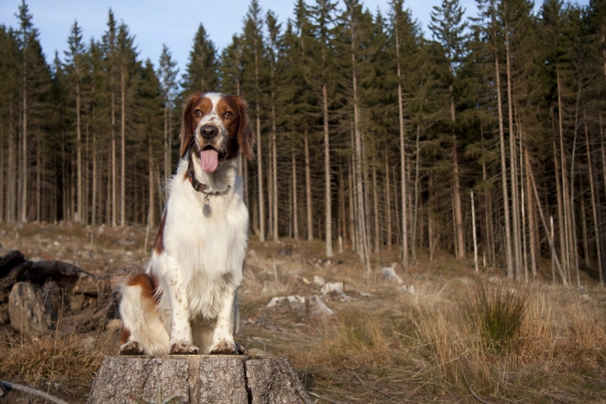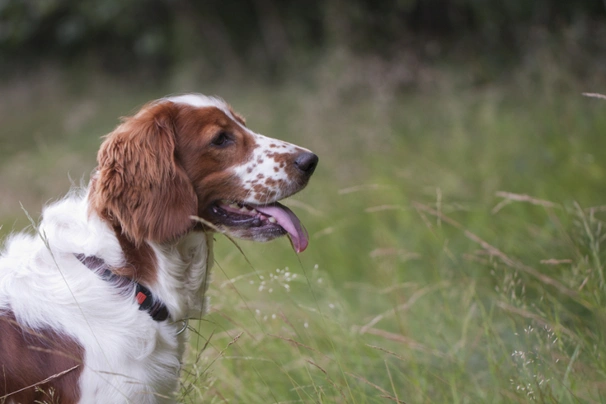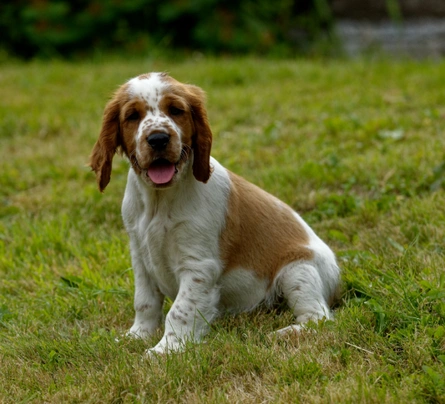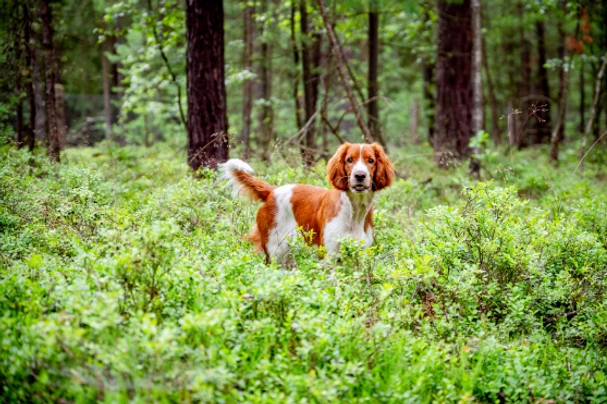Welsh Springer Spaniel
Pros
Cons
Introduction of the Welsh Springer Spaniel
The Welsh Springer Spaniel is a strikingly beautiful and energetic breed best known for its original role as a skilled gundog. These dogs excel in flushing and retrieving game, combining stamina, agility, and intelligence. Today they offer the perfect balance of a devoted family companion and a hardworking sporting dog, blending charm, athleticism, and devotion in one package.
Physically, the Welsh Springer is medium-sized with a compact muscular build, distinguished by its rich red and white coat. Temperamentally, they are affectionate, alert, and eager to please, making them well-suited to active owners who enjoy outdoor pursuits like walking, agility, and hunting sports. Their lively yet gentle nature means they thrive in families with children, as well as in homes where they have plenty of mental and physical challenges.
Ideal owners will be those who can commit time daily to their exercise and enrichment, ensuring Welsh Springers remain balanced and content. While far from demanding, they do need consistent training, socialisation, and grooming to maintain their health and disposition. The breed's intelligence and social nature work harmoniously with owners who seek a loyal, adaptable dog to be a truly integrated family member.
Perfect For
Active individuals or families who enjoy outdoor activities and dog sports, first-time owners willing to invest time in training, households with children, and homes with sufficient garden space for play.
Key Considerations
Requires significant daily exercise and mental stimulation, prone to separation anxiety if left alone lengthy periods, moderate grooming upkeep with regular brushing and occasional professional trims, and sensitive early socialisation and training to channel their high energy positively.
History of the Welsh Springer Spaniel
The Welsh Springer Spaniel is an ancient breed, with artistic depictions dating back to the 16th century. Originally known as the "Welsh Spaniel," it was bred primarily to hunt game birds, a task for which they performed superbly. They were common throughout Wales and the west of England, where they even served practical roles like driving cattle and herding sheep. The breed's ancestry can be traced with certainty to the 18th century, while spaniels showing its signature red and white colouring are visible in historical illustrations from the 16th century.
Early Development
The breed likely developed through crossing various hounds and gundogs native to Britain and Europe during the 18th century, resulting in a versatile hunting dog prized for its ability to "spring" or start game. Welsh gentry prized spaniels at this time and incorporated them into their estates. Though some unconfirmed tales suggest ancestral crossings with the Welsh Corgi Pembroke, it remains speculative.
Modern Recognition
The Welsh Springer Spaniel gained Kennel Club recognition in 1902 under its current name, having been called Welsh Cockers previously. Since then, breed clubs and enthusiasts, including historic kennels such as Linkhill, have worked to preserve and promote the breed. Welsh Springers found fans worldwide throughout the 20th century, including in America, Australia, and India. Today, while less common than the English Springer Spaniel, they enjoy a growing profile both in the show ring and as energetic family companions.
Appearance of the Welsh Springer Spaniel
Size and Build
The Welsh Springer Spaniel is a medium-sized breed. Males typically stand between 46 - 48 cm at the withers, with females slightly smaller at 43 - 46 cm. Weight ranges between 16 - 20 kg for both genders. The breed has a body length slightly longer than its height, indicative of its agility and endurance as a working spaniel. Their compact, muscular frame includes well-sprung ribs, a deep brisket, strong loins, and powerful hindquarters with well-developed second thighs.
Coat and Colours
The coat is flat or straight, dense, and silky in texture, offering water resistance ideal for their traditional outdoors role. Feathering on the front and back legs is pronounced, while the ears and tail have lighter feathering. The only accepted coat colour for Kennel Club registration is a rich red and white pattern, providing a distinctive and elegant appearance that sets the breed apart.
Distinctive Features
The head is slightly domed and finely chiseled with a clear stop. Muzzles are moderately long, straight, and square with well-developed nostrils that vary from flesh-coloured to darker tones. Eyes are medium-sized, dark or hazel, expressing alertness and affection. Ears are set low, small, tapering at the tip in a vine-leaf shape, hanging closely to the cheeks. The tail is typically docked historically but now is carried low with a gentle feathering, held gaily when the dog is alert or moving. Welsh Springers have cat-like, round feet with thick pads and strong nails, further aiding their stamina.
Gender Differences
Males are generally slightly larger and more robust in build but share similar coat and colouring with females. Temperamentally, males may exhibit a natural dominance tendency if leadership is not established, while females are often a bit more reserved but equally affectionate. Both sexes require similar care and exercise to remain healthy and balanced.
Faults as defined by the Kennel Club include significant departures from the breed standard that impair health or function. Testicles should be fully descended in males, and slight variation in size and weight is acceptable.
Temperament of the Welsh Springer Spaniel
Core Personality Traits
Welsh Springer Spaniels are naturally good-natured and affectionate, equally comfortable in the field or home. While young dogs can be boisterous and spirited, maturity brings a more settled, loyal companion. They thrive on social interaction, eagerly forming strong bonds with their family, and are prized for their affectionate, intelligent, and playful nature.
Social Behavior
Welshies generally welcome their families warmly and demonstrate particular patience and kindness with children. They show wariness and aloofness towards strangers but rarely display aggression, instead opting for cautious observation and alerting their owners. They are good with other dogs if properly socialised but may chase smaller animals due to a strong prey drive.
Working Instincts
As a gundog breed, they retain a high prey drive and deep hunting instincts, including their remarkable scenting abilities. This predisposition makes them excel in activities like agility, obedience, and tracking. Their natural eagerness to please helps mitigate chasing behaviours with consistent training.
Common Behavioral Challenges
Welsh Springer Spaniels may develop separation anxiety if left alone for too long, leading to stress and destructive behaviours. Their intelligence means they require constant mental and physical engagement, or they may become bored and mischievous. Early socialisation and positive reinforcement training are essential to prevent dominant behaviours and encourage balanced temperaments.
Intelligence / Trainability of the Welsh Springer Spaniel
Welsh Springer Spaniels rate highly for trainability, thanks to their intelligence and eagerness to please. They respond best to positive reinforcement, excelling in canine sports such as agility, obedience, and flyball. Training should commence early and remain consistent and fair throughout their lives, respecting the breed's sensitive nature.
Puppy Training Priorities
During the first six months, focus on socialisation to new people, places, and sounds, alongside establishing boundaries and basic commands like come, sit, stay, heel, and leave it. Ensuring the puppy appreciates who leads prevents future dominance issues.
Training Methods That Work
Welsh Springers do not respond well to harsh corrections but thrive under gentle, patient, and motivational techniques. Short, varied sessions combat boredom. High-value treats and interactive toys serve as excellent motivators, but food rewards should be balanced to prevent obesity.
Advanced Training Potential
The breed excels in advanced obedience competitions, scent work, and gundog trials. Their stamina and mental sharpness make them ideal candidates for demanding tasks requiring sustained focus and activity.
Common Training Mistakes
Ignoring early socialisation or relying on punitive methods can lead to stubbornness and behavioural issues. Failing to provide sufficient exercise or mental challenge can result in boredom-driven destructive behaviour. Recall training is critical due to their strong hunting instincts.
Children and other
Age-Specific Interactions
Welsh Springer Spaniels are ideal family pets, displaying patience and a gentle nature with children of all ages. Toddlers require careful supervision during play due to the dog's youthful high energy and potential to knock them accidentally. Older children and teenagers typically benefit from the breed's playful and affectionate temperament, enjoying interactive games and shared exercise.
Teaching Children Proper Interaction
It's important to educate children on respecting dog boundaries, gentle handling, and understanding signs of overstimulation or fatigue. Supervised introductions and setting clear boundaries prevent accidents and foster strong bonds.
Breed-Specific Considerations
The breed's medium size and boisterous nature mean that homes with very small children need to be cautious to prevent accidental knocks. Welshies excel in active households where children can match their energy and participate in training or play sessions.
Creating Safe Environments
Supervision is essential during all child-dog interactions. Safe spaces such as a quiet corner or crate area provide the dog with retreat options if needed. Early socialisation of the dog to children aids in comfort and confidence on both sides.
Health of the Welsh Springer Spaniel
Breed-Specific Health Conditions
Welsh Springer Spaniels have a life expectancy of 12 to 15 years when cared for adequately. They are predisposed to certain hereditary conditions including glaucoma caused by goniodysgenesis, hip dysplasia, primary epilepsy, and ear infections. Prevalence rates vary but responsible breeders test to minimise these risks.
Genetic Testing Requirements
Breeders should utilise the BVA/KC Hip Dysplasia Scheme, BVA/KC/ISDS Gonioscopy for eye health, and BVA/KC Eye Scheme to screen for inherited conditions. DNA testing for glaucoma is crucial in limiting the spread of this condition within the breed.
Preventive Healthcare Schedule
Puppies receive initial vaccinations between 10-12 weeks, followed by boosters. Consultation with a vet regarding the need for ongoing boosters is advised. Spaying and neutering are generally recommended between 6 to 12 months old, based on vet guidance. Regular ear cleaning and weight monitoring help prevent infections and obesity complications.
Insurance Considerations
Insurance claims most often relate to hereditary conditions, injuries, and common ailments like ear infections. A comprehensive lifetime insurance policy is advised given the breed's propensity to develop genetic issues requiring treatment.
Caring for the Welsh Springer Spaniel
Daily Care Routine
A typical day for a Welsh Springer Spaniel includes at least two exercise sessions: a brisk walk in the morning and a longer, stimulating activity in the afternoon. Between activities, attention should be given to mental enrichment via games or training. Regular grooming maintenance daily ensures coat health. Feeding should be provided twice daily, matched to the dog's life stage.
Living Environment Needs
Welshies thrive best in homes with secure, sizable gardens to run and explore safely. They do not adapt well to apartment living due to their high activity requirements and need to roam freely. Climate-wise, their dense coat protects adequately in cooler temperatures, but care must be taken in summer to avoid overheating.
Seasonal Care Adjustments
In summer, exercise should be scheduled during cooler parts of the day with plenty of fresh water available. Coat drying after swimming or wet weather is essential to prevent skin issues. Autumn and spring require increased grooming to manage shedding seasons.
Senior Care Adaptations
Older Welshies benefit from softer bedding, joint support supplements, and moderate low-impact exercise to maintain muscle tone. Reduced food portions tailored to senior metabolism help prevent weight gain. Monitoring sensory decline and making environmental adjustments can improve comfort.
Grooming of the Welsh Springer Spaniel
Coat Maintenance Schedule
Welsh Springer Spaniels require daily brushing to prevent matting and tangles, focusing especially on feathered areas like legs, ears, and belly. During shedding seasons in spring and autumn, more frequent grooming is necessary to remove loose hair. Regular drying post-swimming is vital due to their love of water.
Professional Grooming Requirements
Professional grooming every 3-4 months is advisable to keep coat condition optimal and tidy. This often involves trimming feathering and ensuring the coat remains silky and free of debris. Costs typically range between ;40 to ;70 per session in the UK.
Home Grooming Techniques
Effective home grooming tools include slicker brushes, grooming gloves, and combs. Ears should be checked weekly for wax build-up or signs of infection and gently cleaned if necessary. Nail clipping, teeth brushing, and coat conditioning are integral to the routine. Using dog-specific shampoos and conditioners helps maintain skin health.
Common Grooming Challenges
Matting in feathered areas is the primary concern and requires preventative daily care. Ear infections can occur if moisture remains trapped; thorough drying and routine cleaning mitigate this risk. Seasonal shedding demands patience and consistent grooming effort.
Exercise of the Welsh Springer Spaniel
Daily Exercise Requirements
The Welsh Springer Spaniel is a high-energy breed requiring approximately 2 hours of exercise daily. This should include varied activities such as walking, running, and safe off-lead play in secure environments. Young puppies should have restricted exercise to protect developing joints, with careful monitoring of impact and duration.
Suitable Activities
Ideal activities include agility, obedience trials, flyball, scent work, and swimming, all catering to their physical and mental needs. Play sessions involving retrieve games and problem-solving toys help satisfy their natural working instincts.
Exercise Restrictions
Exercise should be limited for puppies under 12 months to avoid stress on bones and joints. Overstocking, high-impact activities, or stairs should be minimised during growth phases. In extreme weather, adjust duration and timing to avoid heatstroke or cold stress.
Mental Stimulation Ideas
Welsh Springers benefit from puzzle toys, scent detection games, obedience training, and interactive play that offers problem-solving challenges. Regular changes to routine prevent boredom and promote lifelong engagement.
Feeding of the Welsh Springer Spaniel
Nutritional Requirements
Welsh Springer Spaniels require a balanced diet with appropriate protein levels (around 20-25%) and moderate fat content to support their energetic lifestyle. Caloric intake should be adjusted by age, activity level, and weight.
Feeding Schedule Guidelines
Puppies benefit from three to four small meals per day, tapering to two meals for adults. Portion sizes vary by individual build and activity. Treats should be limited to avoid excessive calorie intake.
Special Dietary Considerations
The breed may be prone to allergies, so high cereal content and artificial additives should be avoided. Supplementing with omega fatty acids supports coat and skin health. Careful monitoring for food sensitivities is encouraged.
Weight Management
Regular weighing and body condition scoring are essential to prevent obesity, especially post-neutering or in senior years. Diet and exercise adjustments should be made promptly to maintain optimal health.
Welsh Springer Spaniel price
Welsh Springer Spaniel puppies from responsible, Kennel Club-registered breeders typically range in price from around 800 to ;1,500 depending on the breeder and lineage quality. Pet-quality dogs generally sit at the lower end, while show-quality puppies command higher prices. Prices may vary across the UK, with higher rates in the South East and London compared to Northern regions.
Initial setup costs include essentials such as a crate, collar, leads, feeding bowls, grooming tools, and quality puppy food, which can total around ;200 to ;300. Monthly maintenance covering premium food, grooming supplies, routine vet visits, and insurance will generally amount to ;70 to ;100.
Health insurance premiums depend on the level of cover, age, and location but expect around ;25 to ;50 monthly for lifetime policies. Veterinary care costs including vaccinations, neutering, and potential hereditary health tests should be budgeted within a yearly veterinary spend of approximately ;500 to ;1,000, depending on the dog's health status and age.
Overall, the lifetime ownership costs including diet, exercise, routine healthcare, occasional professional grooming, and insurance make Welsh Springer Spaniels a moderate to high cost breed to maintain.
You can find Welsh Springer Spaniel for sale on Pets4Homes to explore current availability and pricing from trusted breeders.
Buying advice
When looking to buy a Welsh Springer Spaniel, prospective owners should prioritise ethical breeding practices and health transparency. It's wise to view puppies in the breeder’s home, meet the dam, and confirm the puppies are microchipped and wormed.
The breed is rising in popularity in the UK, leading to higher prices and potential scams. Avoid purchasing puppies unseen or through online deposits. Prices for well-bred puppies generally range from ;800 to ;1,500, varying by pedigree quality and breeder reputation.
Check for health test certificates including the BVA/KC Hip Dysplasia Scheme, BVA/KC/ISDS Gonioscopy, and the BVA/KC Eye Scheme. Ensure contracts include health guarantees and clear ownership terms.
Be cautious of tail docking claims since it is now banned except in exceptional working dog cases. Thoroughly interview breeders about breeding practices, dam health, and socialisation protocols. Consider adoption from breed-specific rescues to provide a loving home to a dog in need.
You can find Welsh Springer Spaniel for sale on Pets4Homes to review current listings and contact reputable breeders directly.
